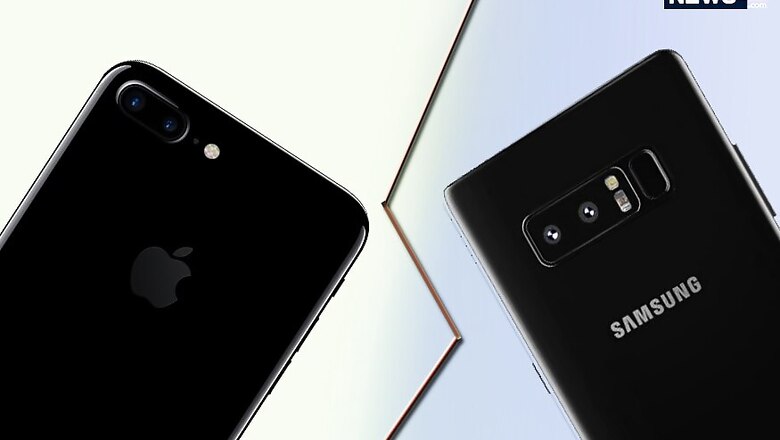
views
After Samsung took a sceptical decision of not going for a Dual Camera in its flagship smartphones, Galaxy S8 and S8+, the South Korean smartphone maker has now opted for one in its latest flagship device, the Galaxy Note 8. Its fierce rival Apple, on the other hand, had realised where the camera trend was heading and had introduced a dual camera setup in its iPhone 7 Plus launched last year. By now, Apple’s dual camera has made quite a name for itself as having one of the best camera prowess found in smartphones. This was till Samsung entered the race. While Samsung’s dual camera technology has only been unveiled as of now, it looks to be promising and a fierce competitor to the existing rulers in this segment. Judging from the specifications that each of these flagship cameras carries, here is a quick comparison between the current best offerings by the two biggest smartphone giants in the world.
Apple iPhone 7 Plus
First things first, Apple has outrightly beaten every other attempt at a dual camera setup in a smartphone with the kind of detail that can be found in its final pictures. Looking at its specifications, the iPhone 7 Plus carries a 12-megapixel dual camera setup at the back that offers a 2x optical zoom along with a 10x digital zoom. The setup also comes with an Image Signal Processor (ISP) built into its A10 fusion chip that claims to process over 100 billion operations on a single photo. This, in turn, speeds up and improves focusing and colour quality.
Apple optimised the camera setup on the iPhone 7 Plus to provide three times longer exposure times, receive 50 percent more light and produce 50 percent brighter flash as compared to the camera on the iPhone 6s. Getting into its working, the iPhone 7 Plus uses a 12-megapixel wide-angle sensor (f/1.8) coupled with a 12-megapixel telephoto sensor (f/2.8) to produce depth effect in the images. Additional features offered by the camera include Optical Image Stabilisation, Auto Image Stabilisation, Phase Detection Auto Focus and more.
The iPhone 7 Plus carries video recording capabilities of 4K video recording at 30 fps, 1080p HD video recording at 30 fps or 60 fps, 720p HD video recording at 30 fps with Optical image stabilization for video and also Slow‑motion video support for 1080p at 120 fps and 720p at 240 fps.
Watch Video: Apple iPhone 7 Plus Review
Samsung Galaxy Note 8
Now let us have a look at the contender. Samsung took its own sweet time to bring an at-par camera technology to its flagship device. One look at what Samsung has to offer and you get to know that the wait was worth. Samsung has introduced a 12-megapixel dual camera setup on its Galaxy Note 8, with the claims of being the world’s first camera setup to carry a dual Optical Image Stabilisation (OIS) as well.
Apart from this, the camera on the Galaxy Note 8 offers 2x Optical Zoom and Samsung’s own ‘Live Focus’ feature, which is essentially an add-on to a regular Bokeh Effect. The Live Focus allows users to adjust the level of blur in the images clicked through the dual camera setup, even after the image is clicked.
The dual camera setup of the device carries a 12-megapixel telephoto (f/2.4) sensor and a 12-megapixel wide-angle (f/1.7) sensor. Another big addition that the camera boasts of is the Dual Capture feature that captures things outside the camera frame in addition to the regular click. Samsung smartphonees have also been widely popular for their low-light photography, which Samsung has carried to the Galaxy Note 8 as well.
The video recording capabilities of the Galaxy Note 8 include 4K video recording at 30 fps, 1080p HD video recording at 30 fps or 60 fps, 720p HD video recording at 30 fps, VDIS (Video Digital Image Stabilization) and Slow motion video support for 720p at 240 fps.
Watch Video: Samsung Galaxy S8 | Top 5 Features


















Comments
0 comment